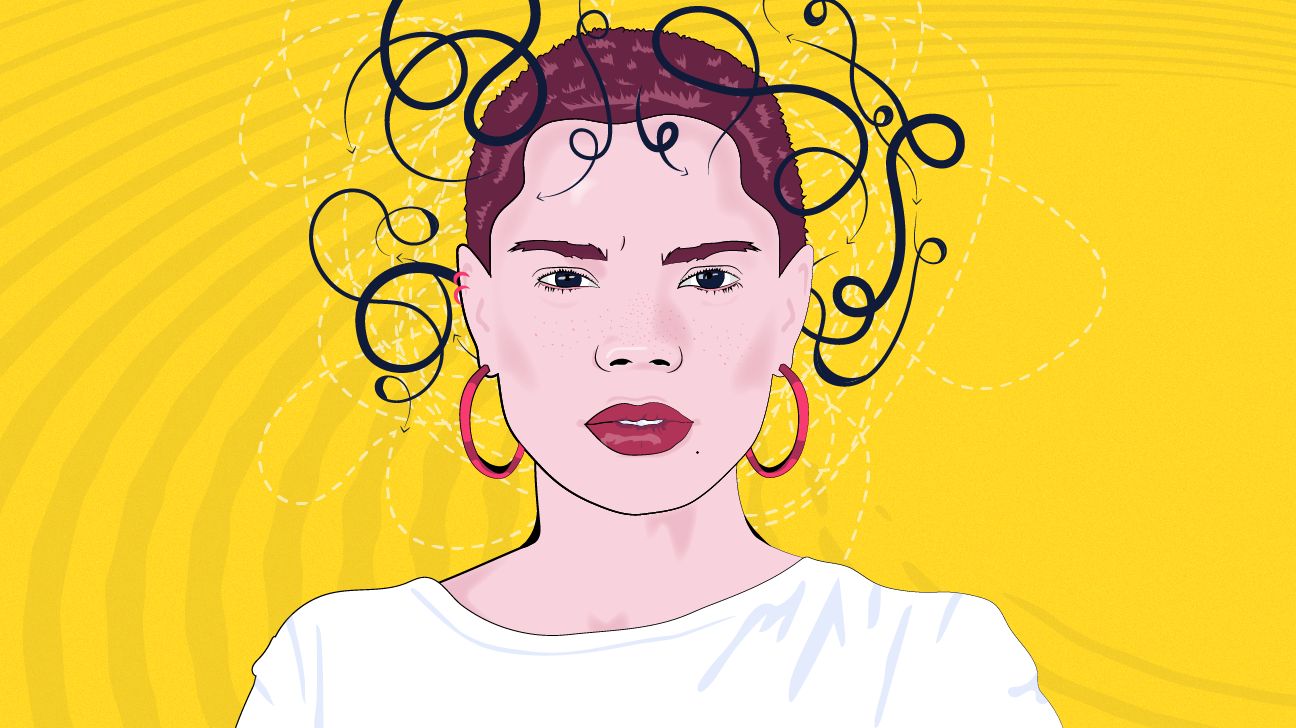Ever feel like your mind is a racetrack and your thoughts are like cars, zooming around at breathtaking speed? Though, unlike actual races, your thoughts aren’t organized. They whip about aimlessly, in endless loops, scattering your focus.

They can overwhelm you by taking many forms, from work worries to rumination on the latest news headlines.
Examples of how thoughts can race
- You just got out of an intense meeting where not only did you feel criticized but a pile of new projects were dropped in your lap. Now you don’t even know where to start.
- A family member is going in for medical tests, and every minute you wait to hear the results, you feel more and more pessimistic.
- You had a very awkward conversation with your crush and can’t stop thinking about what you wish you had said.
- You intended to squeeze six errands into one free afternoon, but you got a flat tire. Now, you have seven errands.
- Tomorrow’s a big day, but you can’t get to sleep imagining how everything’s going to go.
Pump the brakes
You can decide which thoughts lead the pack, which ones need a pit stop, and which ones to divert your attention from for now. Read on for some habits that will help you control racing thoughts and prevent pileups.
Try these steps to slow things down when you’re feeling overwhelmed.
- Meditate. One study found that both seated meditation (zazen) and moving meditation (tai chi) helped people cope with stress. If you are a meditation beginner, try an app with guided audio meditations. If you prefer to get physical, go with a tai chi video.
- Try a mantra. Pick a short, empowering go-to phrase to repeat to yourself when thoughts are racing.
- Get some vitamin nature. Humans seem to have an innate attraction to nature that improves mood and reduces stress. Go outside where you can and soak in some sunshine.
- Exercise. Research says physical activity reduces anxiety, depression, and stress. Pick a physical activity that brings you joy.
- Write it out. A 2019 study made a connection between personal writing (like journaling), gaining perspective, and better understanding of yourself and others. Try to capture a racing thought and pin it down on paper.
- Talk to someone. Talking to someone can be like giving yourself an off-ramp for some of those racing thoughts. Find a trusted friend (or therapist) who can listen without judging.
- Take a deep breath. And another one. Deep breathing can improve mood and lower stress, according to both self-reported evaluations of study participants and objective measures like heart rate and cortisol levels.
- Take naps. Lack of sleep or insomnia can make racing thoughts worse. Give your brain a less stimulated environment by adopting coffee naps, power naps, or stronger sleep habits.
- Stop doom scrolling online. Giving your brain more information to process is like telling it to go faster while adding more weight. Try our tips for curbing bad social media habits.
What fuels your racing thoughts? Modern life may be partly to blame. Here are other possible fuel sources for racing thoughts:
- Poor sleep or insomnia may increase stress and trigger racing thoughts.
- Stress increases negative thoughts while simultaneously making you feel less capable of managing them.
- Social situations — especially if you have social anxiety or are part of a marginalized group — can ignite thoughts about being judged, accepted, or “performing” as expected.
- Substances, such as caffeine, drugs, or alcohol, can stimulate your nervous system or change thought patterns.
Keeping a journal can help you track your triggers. Once you find a pattern, it’ll be easier to adopt some coping strategies or seek treatment with a professional.
Racing thoughts don’t necessarily mean there’s something wrong. Everyone gets stressed and overwhelmed sometimes. However, there are some mental health conditions that can exacerbate the degree of racing thoughts.
- anxiety
- attention deficit hyperactivity disorder (ADHD)
- bipolar disorder
- obsessive compulsive disorder
- depression or unresolved past trauma
There’s no way of knowing if any of these are the cause — or what type of treatment you need — unless you get a diagnosis. For mental health conditions, this can also take a lot of time.
An appointment with a doctor or therapist will be helpful for learning tools, like the ones mentioned above, but if your condition is chronic, you’ll likely need to work with a professional over longer periods of time.
Medication and its purpose
Getting medication for a mental health disorder isn’t like getting OTC drugs. Most doctors will only recommend medication after many appointments. This is so that they can prescribe the right medication, in hopes of as few side effects as possible. Medications may include:
- antidepressants
- anti-anxiety medications
- antipsychotics
- mood stabilizers
- Adderall (for ADHD)
- sleep aids
You don’t necessarily want to slam on the brakes when it comes to your thoughts. (20-car pileup? No thanks.) Think of the techniques listed above as ways to help coordinate your race in the long term.
Adopt some stress-relieving habits or find ways to focus your mind and energy on some productive activities.
Finally, accept that some thoughts will just have to run their course. Once you learn some better organizational skills, you’ll be able to better prioritize your thoughts and avoid burn-out.
Anna Lee Beyer writes about mental health, parenting, and books. Follow her on Facebook and Twitter.

